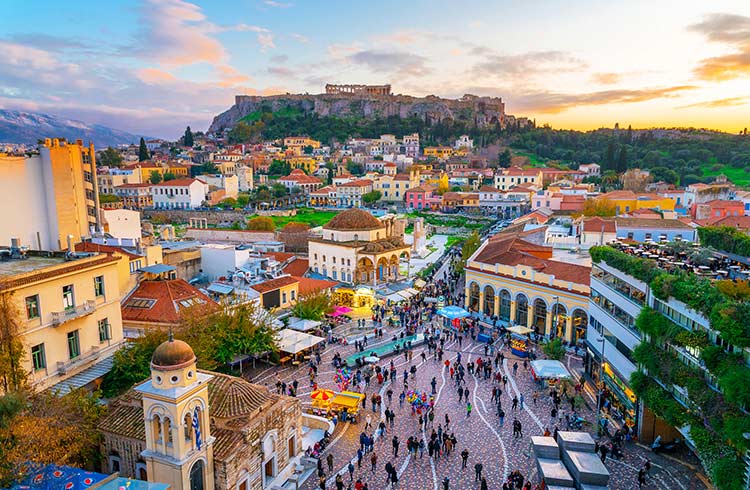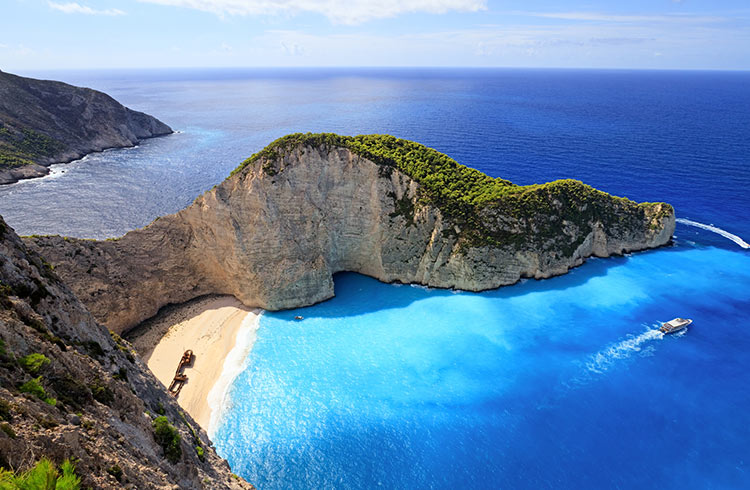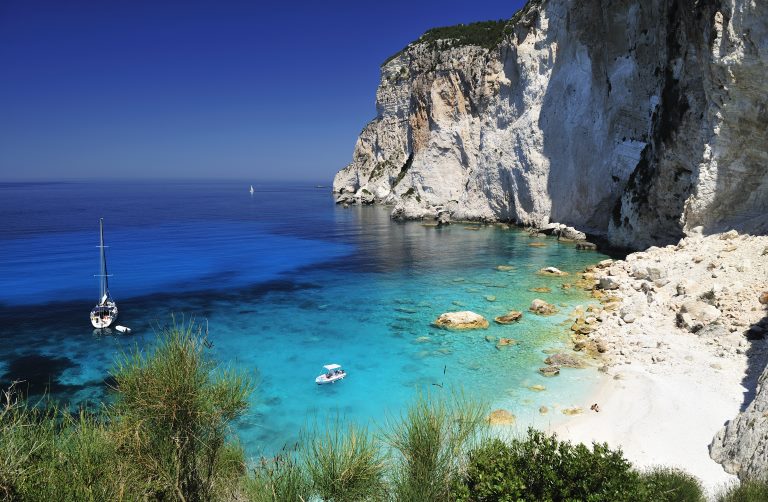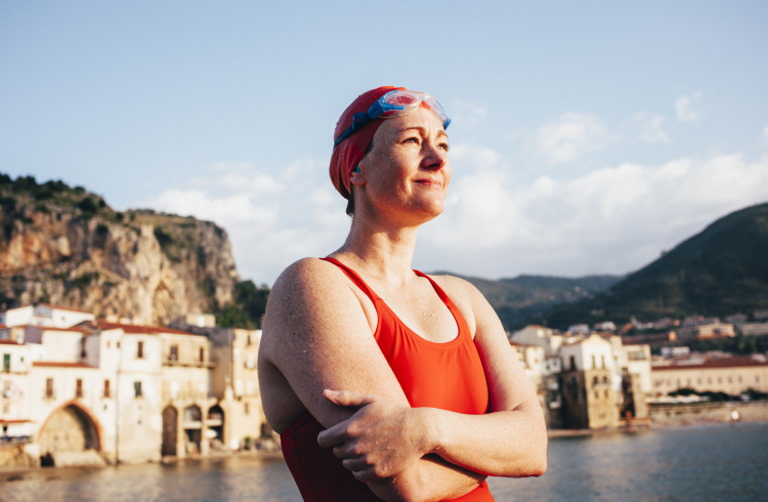Is Greece Safe? 8 Essential Travel Tips for Visitors
How safe is Greece for travelers? Rebecca Hall, a solo traveler who has lived in Greece since 2008, shares her tips on the ever-changing safety situation.
 Photo © Getty Images/George Pachantouris
Photo © Getty Images/George Pachantouris
Travelers and crime in Greece
Since 2015, Greece has experienced a financial crisis and, due to its geographical position, shouldered the majority of people involved in Europe’s refugee crisis. This had led to many Greeks blaming "foreigners" for pickpocketing and petty crime in the country. Crime gangs tend to be attracted to the easy pickings of tourist destinations.
You can avoid becoming a victim of petty crime by not looking obviously like a tourist. Don’t hang a large camera off your shoulder or constantly look at your phone. Walk with purpose and as if you know where you are going. If you need to check directions, sit at a café, don’t stand in the middle of the street.
- Always keep your belongings in sight, and avoid putting your wallet, money or phone in your back pocket
- Be especially alert for pickpockets in the large cities
- The potential for pickpocketing is high on public transport. It’s always a good idea to keep an eye on your valuables while waiting at the airport, cruise terminals, major bus and train stations, and the port of Piraeus
- To mitigate issues with theft, consider using a decoy wallet so if it does get lifted, thieves won't get the money and cards you have hidden. Spread out any cash and cards over your body and invest in a money belt worn under your clothing. There is also excellent anti-theft travel clothing with secret pockets where you can hide your valuables
- Keep your bags locked at the hostel, and expensive items locked in a safe.
The nightlife scene is safe in Greece, however, you should always drink responsibly and keep your wits about you. Owing to its warm climate most of the year, Greeks tend to mix outdoors in village squares filled with tables and cafés and whole families congregating. It’s a very inclusive café society. If sitting outside at night, be sure to keep an eye on your belongings.
Protests and civil unrest in Greece
The financial crisis in 2008 meant many Greeks saw their income and pensions significantly reduced after restrictions were imposed on the country by the E.U.
Greeks have not been known to sit down and take adversity lightly, hence demonstrations – mainly peaceful – would take place outside Parliament in Syntagma Square in Athens and in cities such as Thessaloniki.
In the unlikely event you find yourself in the midst of a demonstration or protest that you feel might turn ugly, pop into a café and wait it out. The owners usually shut up shop until it’s all over and safe for you to leave.
Common travel scams in Greece
Be alert when using crowded public transport
During peak hour while squashed together on public transport, it’s common for someone to bump into you, and while you are distracted or looking the other way, the person apologizes and their accomplice opens your bag (even if it’s close to your body) and steals from you.
It happened to me on the Metro in Athens on a busy night – but I tend to only carry a card and small amounts of cash. And in 12 years of living in Greece, it’s only happened once.
The nun scam
Beware of the little old lady dressed as a nun who will want to give you a cross – she’s not a nun and will swipe your belongings while you’re distracted. If you are approached, just be very firm and outrightly say ‘no’ as they walk towards you, no matter how insistent they may be.
The café scam
Do not put phones, cameras or wallets on a table while having something to eat or drink. There is a scam, usually involving young children, who will approach you with a map for you to look at while they either ask for directions, tell you about places you should visit, or hold up a sign written in English begging for money. The sign or map is held above your phone and while you are distracted, their accomplice takes your valuables.
Also, never soften if a woman approaches you with a baby – it is particularly common for women to operate this scam.
Taxi scams in Greece
Beware of being charged too much when traveling to and from the airport or port. There are taxi ranks at both places, and they charge a standard fare to travel to the center of Athens. There are signs in the taxi stipulating the charge rates, and drivers are not allowed to go over these rates.
Another scam occurs when you hand over the cash, and drivers have been known to switch higher denomination notes with smaller ones, suggesting you paid less than you did. So, always count out your money when paying the driver.
Alternatively, download the Beat app before you travel and use it to book ride-share taxis in Greece. Just like UBER, (which is banned in Greece), you can add your credit card details and book a car in the same way. It’s much more reliable and with the option to Rate Your Driver, drivers have been known to increase their level of customer service.
Natural hazards in Greece
Earthquakes
Greece sits on the Eurasian and Aegean Sea Plates, and tremors can occur, especially in the Ionian islands and down in Crete. Some tremors are little, and can often be mistaken for a large truck rumbling past.
However, large earthquakes have caused widespread damage in the past. In September 1999, a 6.0 magnitude earthquake occurred near Mount Parnitha, a mountain range north of Athens. The earthquake caused more than US $3 billion of damage, 143 lives were lost, and 1,600 people were treated for injuries.
In the unlikely event of a larger earthquake occurring during your visit, follow the instructions of your hotel staff, who will offer earthquake safety advice, and keep an eye on local news for updates.
Air pollution
Athens can be notorious for air pollution. However, authorities in Athens have pledged to ban the use of diesel vehicles in the capital area by 2025 and inroads have been made to improve this in the summer of 2020 by pedestrianizing much of the city center.
Asthmatics or travelers with respiratory illnesses should avoid Athens in July and August, the worst months for pollution. If you find yourself in Athens on any heavily polluted day, stay indoors as much as possible. Make sure you pack the medications you need to make breathing easier while traveling.
Beach safety
Take care when swimming. Don't get too close to the rocky outcrops and cliff faces, as waves can smash you against the rocks, and the barnacles and oysters attached to them are razor-sharp.
Very few beaches have a lifeguard on duty, so swim within your capabilities. If you're not sure if a beach is safe for swimming, ask a local.
Watch out for small craft and motorboats near to shore. Not all, but some, skippers seem to believe it's the responsibility of the swimmer to get out of the way of their boat. Don't argue the point – a spinning propeller will win every time.

Motor scooter safety in Greece
Hiring a motor scooter is a great way to get around on the islands. However, dusty, narrow, winding, poorly-lit roads are not the place to learn to ride.
Inexperienced riders are often involved in accidents and rarely wear proper protective clothing. If you do plan to hire a scooter, you will need a valid driver's license and you must wear a helmet.
Quad bikes are particularly dangerous. Their center of gravity is different from a two-wheeled bike, and can easily throw the rider off at a sharp turn. It's quite common for the quad bike to then run over the rider, or tip over and trap the rider underneath. Be extra careful if you do choose to enjoy either of these activities and check your travel insurance policy to make sure you are covered.
Is Greece safe for solo women travelers?
As a solo traveler myself, it can be considered anathema for a woman to want to eat alone in a restaurant and she’ll often get asked to join a family table – especially if there are elderly people there. It’s the Greek philoxenia they exude – to look after you and literally translated as ‘kindness to strangers’. It also stems from linguistics as interestingly; there is no Greek word for ‘privacy’ – meaning there is little understanding of the concept.
If you really do want to be alone, then politely tell them so – but to be honest, Greeks love to practice their English skills, especially if they have young children who can translate for older members. It’s a lovely opportunity to meet new people.
Is Greece safe for LGBTQ+ travelers?
Same-sex marriage was legalized in 2015, and same-sex sexual activity has been legal in Greece since 1951. Anti-discrimination laws in the employment space have been in place since 2005.
Greek people are particularly tolerant and from personal experience, open their hearts to any and everyone, regardless of gender and sexual preference. So long as the Greeks are treated with respect, it is reciprocated.
So, just how safe is Greece for travelers?
This is a roundup of things to be aware of when traveling in Greece. It is not to say that these things will definitely happen to you. As with big cities anywhere, there is always the likelihood of petty crime, even within your own country.
My tip is to try to ‘look’ confident and be very firm if anyone approaches you to beg, especially with the map on table example. Don’t feel sorry for people begging with children, and don’t be afraid to be impolite.
Greece enjoys a fantastic year-round climate, offering various summer and winter activities for visitors, and is a very safe country to travel.
Before you buy a travel insurance policy, check your government travel warnings and health advice – there may be no travel insurance cover for locations with a government travel ban or health advice against travel.
Related articles
Simple and flexible travel insurance
You can buy at home or while traveling, and claim online from anywhere in the world. With 150+ adventure activities covered and 24/7 emergency assistance.
Get a quote


No Comments